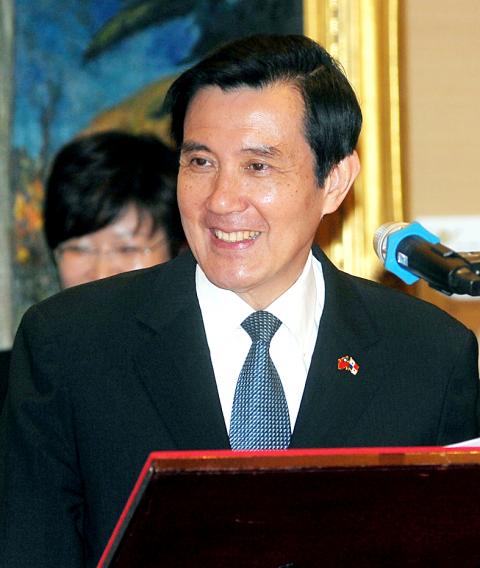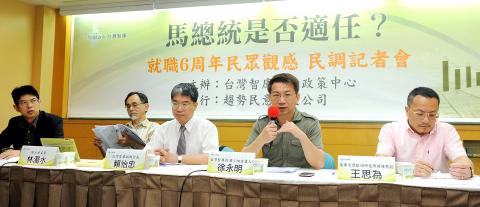President Ma Ying-jeou’s (馬英九) approval rating has fallen by more than half since he assumed office in 2008, according to a survey released by Taiwan Indicators Survey Research (TISR) yesterday ahead of the sixth anniversary of his presidency on Tuesday next week.
The survey showed Ma’s latest approval rating at 17.9 percent, down 19.9 percentage points from June 2008, a month after he was sworn in for his first term, while his disapproval rating increased by more than 1.5 times from 46.2 to 71.1 percent over the same period.
The number of those polled who deem the president untrustworthy has also risen since Ma was first elected, climbing from 55.4 percent in June 2008 to 62.2 percent.

Photo: CNA
On a scale of 1 to 100, respondents in TISR’s poll gave Ma a failing grade of 44.3 points for his performance as head of state over the past six years. A further breakdown of the results shows that even those who identified themselves as supporters of the Chinese Nationalist Party (KMT) that Ma heads as chairman “flunked” the president, giving him an average score of 59.7.
The survey participants who said they are pan-green supporters or swing voters scored Ma’s performance at 32.8 and 41.1 points respectively, the results show.
Respondents’ dissatisfaction was not confined to Ma, with most Cabinet members also failing to impress the majority of those polled.

Photo: Wang Min-wei, Taipei Times
As many as 76 percent of participants ranked Atomic Energy Council Minister Tsai Chuen-horng’s (蔡春鴻) achievements in office as the least remarkable, followed by those of Council of Agriculture Minister Chen Bao-ji (陳保基) at 72.1 percent and of Minister of the Interior Chen Wei-zen (陳威仁) at 69.6 percent.
Only two of the Cabinet’s 12 members had approval ratings above 20 percent: Minister of Culture Lung Ying-tai (龍應台) (24.6 percent) and Minister of Justice Luo Ying-shay (羅瑩雪) (21.2 percent).
Respondents said they are most unsatisfied with the work of Minister of Transportation and Communications Yeh Kuang-shih (葉匡時) and Minister of Economic Affairs Chang Chia-juch (張家祝), who were given the highest disapproval ratings at 35.8 and 35 percent respectively.
The survey was conducted from Wednesday to Friday last week through a random telephone sampling of 1,001 people aged 20 and older. It has a confidence level of 95 percent and a margin of error of 3.1 percentage points.
A separate survey conducted by Taiwan Thinktank put Ma’s approval rating at nearly the same level as TISR’s poll on 17.4 percent and yielded a slightly higher disapproval rating of 72.8 percent.
As many as 64.8 percent of respondents in the think tank’s poll said Ma had not done a good job, Taiwan Thinktank deputy executive Lai I-chung (賴怡忠) told a press conference yesterday.
Soochow University professor Hsu Yung-ming (徐永明) said the think tank poll shows Ma’s integrity is being questioned by the public, as 69. 5 percent of respondents said the president would not protect Taiwanese interests in cross-strait talks.
Meanwhile, 53.8 percent of those polled by the think tank said they trusted former Democratic Progressive Party (DPP) chairperson Tsai Ing-wen (蔡英文), Hsu added.
Asked if the DPP could gain ground in the seven-in-one elections in November, former DPP Legislator Lin Cho-shui (林濁水) said Ma’s incompetence would hurt the KMT’s showing in the electoral contests.
The Taiwan Thinktank poll was conducted from April 26 to April 28, taking 1,230 samples with a margin of error of 2.8 percentage points.

Tropical Storm Gaemi strengthened into a typhoon at 2pm yesterday, and could make landfall in Yilan County tomorrow, the Central Weather Administration (CWA) said yesterday. The agency was scheduled to issue a sea warning at 11:30pm yesterday, and could issue a land warning later today. Gaemi was moving north-northwest at 4kph, carrying maximum sustained winds near its center of up to 118.8kph and gusts of 154.8kph. The circumference is forecast to reach eastern Taiwan tomorrow morning, with the center making landfall in Yilan County later that night before departing from the north coast, CWA weather forecaster Kuan Shin-ping (官欣平) said yesterday. Uncertainty remains and

SEA WARNING LIKELY: The storm, named Gaemi, could become a moderate typhoon on Wednesday or Thursday, with the Taipei City Government preparing for flooding A tropical depression east of the Philippines developed into a tropical storm named Gaemi at 2pm yesterday, and was moving toward eastern Taiwan, the Central Weather Administration (CWA) said. Gaemi could begin to affect Taiwan proper on Tuesday, lasting until Friday, and could develop into a moderate typhoon on Wednesday or Thursday, it said. A sea warning for Gaemi could be issued as early as Tuesday morning, it added. Gaemi, the third tropical storm in the Pacific Ocean this typhoon season, is projected to begin moving northwest today, and be closest to Taiwan on Wednesday or Thursday, the agency said. Today, there would likely

DISRUPTIONS: The high-speed rail is to operate as normal, while several airlines either canceled flights or announced early departures or late arrivals Schools and offices in 15 cities and counties are to be closed today due to Typhoon Gaemi, local governments announced last night. The 15 are: Taipei, New Taipei City, Taoyuan, Tainan, Keelung, Hsinchu and Kaohsiung, as well as Yilan, Hualien, Hsinchu, Miaoli, Chiayi, Pingtung, Penghu and Lienchiang counties. People should brace for torrential rainfall brought by the storm, with its center forecast to make landfall on the east coast between tonight and tomorrow morning, the Central Weather Administration (CWA) said. The agency issued a sea warning for the typhoon at 11:30pm on Monday, followed by a land warning at 11:30am yesterday. As of

CASUALTY: A 70-year-old woman was killed by a falling tree in Kaohsiung as the premier warned all government agencies to remain on high alert for the next 24 hours Schools and offices nationwide are to be closed for a second day today as Typhoon Gaemi crosses over the nation, bringing torrential rain and whipping winds. Gaemi was forecast to make landfall late last night. From Tuesday night, its outer band brought substantial rainfall and strong winds to the nation. As of 6:15pm last night, the typhoon’s center was 20km southeast of Hualien County, Central Weather Administration (CWA) data showed. It was moving at 19kph and had a radius of 250km. As of 3pm yesterday, one woman had died, while 58 people were injured, the Central Emergency Operation Center said. The 70-year-old